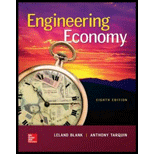
(a):
Calculate the incremental benefit–cost ratio of the mutual alternative.
(a):
Explanation of Solution
Table-1 shows the cash flow of two different projects.
Table-1
| Item | 1 | 2 |
| Initial cost (C) | 60 | 500 |
| Benefit (B) per month | 1.25 | 8 |
| Time period (n) | 60 | 60 |
The discount rate (i) is 0.5%.
The incremental benefit–cost ratio (BC) between the initial alternate do nothing and the new alternate 1 can be calculated as follows:
The incremental benefit–cost ratio is 1.08. Since the incremental benefit–cost ratio is greater than 1, select the new alternate 1 and eliminate the initial alternate do nothing.
The incremental benefit–cost ratio (BC) between the initial alternate 1 and new alternate 2 can be calculated as follows:
The incremental benefit cost ratio is 0.79. Since the incremental benefit cost ratio is less than 1, select the initial alternate 1 and eliminate the new alternate 2.
(b):
Calculate the incremental benefit–cost ratio of the independent alternative.
(b):
Explanation of Solution
The benefit–cost ratio (BC) of alternate 1 can be calculated as follows:
The benefit–cost ratio is 1.08. Since the benefit–cost ratio is greater than 1, select the alternate 1.
The benefit–cost ratio (BC) of alternate 2 can be calculated as follows:
The incremental benefit–cost ratio is 0.83. Since the benefit–cost ratio is less than 1, eliminate the new alternate 2.
Want to see more full solutions like this?
Chapter 9 Solutions
Engineering Economy
- Critically analyse the five (5) characteristics of Ubuntu and provide examples of how they apply to the National Health Insurance (NHI) in South Africa.arrow_forwardCritically analyse the five (5) characteristics of Ubuntu and provide examples of how they apply to the National Health Insurance (NHI) in South Africa.arrow_forwardOutline the nine (9) consumer rights as specified in the Consumer Rights Act in South Africa.arrow_forward
- In what ways could you show the attractiveness of Philippines in the form of videos/campaigns to foreign investors? Cite 10 examples.arrow_forwardExplain the following terms and provide an example for each term: • Corruption • Fraud • Briberyarrow_forwardIn what ways could you show the attractiveness of a country in the form of videos/campaigns?arrow_forward

 Principles of Economics (12th Edition)EconomicsISBN:9780134078779Author:Karl E. Case, Ray C. Fair, Sharon E. OsterPublisher:PEARSON
Principles of Economics (12th Edition)EconomicsISBN:9780134078779Author:Karl E. Case, Ray C. Fair, Sharon E. OsterPublisher:PEARSON Engineering Economy (17th Edition)EconomicsISBN:9780134870069Author:William G. Sullivan, Elin M. Wicks, C. Patrick KoellingPublisher:PEARSON
Engineering Economy (17th Edition)EconomicsISBN:9780134870069Author:William G. Sullivan, Elin M. Wicks, C. Patrick KoellingPublisher:PEARSON Principles of Economics (MindTap Course List)EconomicsISBN:9781305585126Author:N. Gregory MankiwPublisher:Cengage Learning
Principles of Economics (MindTap Course List)EconomicsISBN:9781305585126Author:N. Gregory MankiwPublisher:Cengage Learning Managerial Economics: A Problem Solving ApproachEconomicsISBN:9781337106665Author:Luke M. Froeb, Brian T. McCann, Michael R. Ward, Mike ShorPublisher:Cengage Learning
Managerial Economics: A Problem Solving ApproachEconomicsISBN:9781337106665Author:Luke M. Froeb, Brian T. McCann, Michael R. Ward, Mike ShorPublisher:Cengage Learning Managerial Economics & Business Strategy (Mcgraw-...EconomicsISBN:9781259290619Author:Michael Baye, Jeff PrincePublisher:McGraw-Hill Education
Managerial Economics & Business Strategy (Mcgraw-...EconomicsISBN:9781259290619Author:Michael Baye, Jeff PrincePublisher:McGraw-Hill Education





